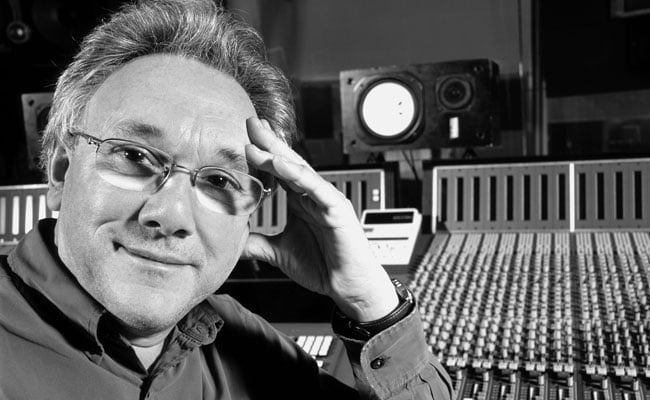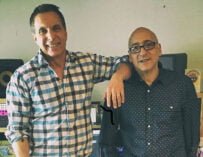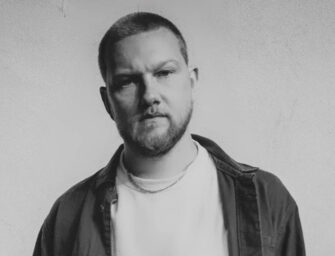
The legendary producer who reputedly ‘invented the Eighties’ reveals he’s an “awful engineer” and often didn’t take any songwriting credits
![]() urham-born Trevor Horn is a prolific music producer, songwriter, musician and singer, whose influence on popular music was such that he has been dubbed ‘The Man Who Invented The Eighties’ and continues to produce some of the biggest names in pop. At the height of his commercial success, Horn helped launch the career of Frankie Goes to Hollywood and has since gone on to produce a staggering array of stellar artists including Paul McCartney, Tom Jones, Cher, Grace Jones, Tina Turner, Lisa Stansfield, Pet Shop Boys, Seal, Simple Minds, Eros Ramazzotti, Mike Oldfield, Marc Almond, Charlotte Church, t.A.T.u., LeAnn Rimes, Genesis and Robbie Williams.
urham-born Trevor Horn is a prolific music producer, songwriter, musician and singer, whose influence on popular music was such that he has been dubbed ‘The Man Who Invented The Eighties’ and continues to produce some of the biggest names in pop. At the height of his commercial success, Horn helped launch the career of Frankie Goes to Hollywood and has since gone on to produce a staggering array of stellar artists including Paul McCartney, Tom Jones, Cher, Grace Jones, Tina Turner, Lisa Stansfield, Pet Shop Boys, Seal, Simple Minds, Eros Ramazzotti, Mike Oldfield, Marc Almond, Charlotte Church, t.A.T.u., LeAnn Rimes, Genesis and Robbie Williams.
Although widely known for being a groundbreaking record producer, Trevor Horn’s songwriting credits are almost equally successful and as varied, starting with writing Baby Blue for Dusty Springfield in 1979. His co-writer then was Geoff Downes with whom he joined forces as The Buggles, and continued to collaborate with on a string of hits in the early 80s, including Video Killed The Radio Star that went to No.1 on the singles charts of 16 countries.
From The Buggles, Horn moved to Yes, where he co-wrote all of their 1980 album, Drama and returned to the band in 1984 to co-write their biggest ever hit Owner Of A Lonely Heart. In the meantime, he’d also managed to write four Top 20 singles for Dollar’s The Dollar Album in 1982, and formed a winning songwriting trio with Malcolm McLaren and Anne Dudley to achieve worldwide chart success with Buffalo Girls, Double Dutch, and Duck For The Oyster, as well as co-wroting McLaren’s subsequent album Swamp Thing in 1985. Art Of Noise was another successful synthpop group and songwriting team, with whom Horn co-wrote Slave To The Rhythm which became a major hit for superstar model Grace Jones, and has eventually become her biggest chart success.
During the last decade, Trevor Horn wrote three international hits for Russian female pop duo t.A.T.u – All The Things She Said, Not Gonna Get Us and Clowns (Can You See Me Now) – the official 2004 Olympic song Pass The Flame, and co-wrote the title track from Lisa Stansfield’s 2004 album The Moment.
As well as remarkable chart success, Horn has earned widespread respect and acclaim across the industry, receiving a Grammy Award in 1996 for Seal’s second album, being appointed CBE in 2011 for services to the music industry, and most recently the Outstanding Contribution to UK Music award at the 2014 Music Producer’s Guild Awards.
It was during the weeks prior to the MPG Awards ceremony that Songwriting caught up with Trevor Horn to reflect on this long and illustrious career in music production, how he chooses projects now and what he’ll say when a song isn’t good enough!
How did you get into music?
“My father was a civil engineer during the day, but he was what they used to call a semi-pro musician – he played five nights-a-week in a dance band playing the double bass. We’re talking about the 1940s and 50s when I was a kid, and I loved records. One of the first records I had was Audie Murphy singing The Last Round-up. I loved that song. I never knew it was about death, but when you’re six you never give a damn about that.
“I never thought much about playing music until everybody in school got a recorder and had to learn to play them. I came back after a weekend and I could play! I thought it was easy, but I was one of the only people in the class that actually could. That was the first time I ever realised that I had any kind of minor musical talent. Then when I was 11 years old I played the double bass in the youth orchestra and I used to stand in for my dad sometimes. I ended up playing in the Ray McVay band and used to do all the big functions; Come Dancing, the World Ballroom Championships and all those kind of things.”
[cc_blockquote_right] I KNEW I WANTED TO BE A HIT RECORD PRODUCER. I THOUGHT IF I COULD KEEP GOING IT WAS ONLY A MATTER OF TIME [/cc_blockquote_right]
What took you along the route to production and pop music?
“I’d always been fascinated by studios. I built one in Leicester and started to record people. Then I had five years working for a music publisher on Denmark Street, where he’d sign the artist and I’d do the demos for them. After about three or four years, a couple of writers got deals from my demos and somebody gave me the shot to let me produce the master. Of course, I fucked it up, which everyone does at first. So we had five years of making demos before we made Video Killed The Radio Star, so Geoff [Downes, the other half of pop duo The Buggles] and I had a lot of time in the studio before we’d made that record, so we’d started to know what we were doing. We put everything into it.”
Did you know straight away that being a producer was what you wanted to dedicate your life to, or was it just a job?
“Oh I knew I wanted to be a hit record producer. I thought if I could keep going it was only a matter of time and I’d get there.”
Who were your idols?
“I didn’t really model myself on anyone. Back then there was no education for producers. One producer had no idea what another producer did. The only way to learn about a recording studio was to be in one! There was no literature – there was no way of finding out how to do the job other than to learn on the spot yourself, so I’m pretty much self-taught. I think the most I learnt from anybody was Bidu [pioneering disco producer] and his backing track for I Love to Love (But My Baby Loves to Dance) by Tina Charles. I just listened to it and listened to it, then after that I just made it up myself.”
Have there been any other songs that inspired you with their production?
“I thought the best produced song ever was I’m Not In Love by 10cc, where the production really made the song. So I always used to say if you’ve got studio fever and you think your tune’s really good, listen to I’m Not In Love and that’ll sort you right out!”

Trevor Horn with the Outstanding Contribution to UK Music award at the 2014 Music Producer’s Guild Awards, alongside Seal
What would you say is the key to being a successful producer?
”It’s funny, people always say my records have a certain sound to them. I suppose because I used to be a musician, I’m ‘manic’ about how people play on my records – I make sure every overdub is really great. If you took a look at one of my multi-tracks and soloed any of the musicians you’d be impressed. I always use really good musicians and I try to give them the space to work and enjoy the session. I mean, I’m a songwriter and a musician, I’m not an engineer. In fact, I was an awful engineer, but I know what’s going on in the desk. I know how it all works and what it’s capable of.”
Before you’re about to produce a track or an album, how do you like to hear the raw material?
“I don’t like fantastically produced demos. I’m absolutely immune to production. You could do anything with it and that wouldn’t sell it to me. All I’m interested in is the song and the idea, so I prefer to have the roughest demo possible. Then I don’t have to worry about reproducing it.”
When do you get involved in the songwriting?
“It depends who’s written the song. Because I used to be a singer, I’m very conscious of how a singer feels on a song and I try to make the song so it’s good to sing. Sometimes I’m lumbered with a song that I don’t particularly want to do, and then the challenge for me is to get it so I like it.
[cc_blockquote_right] I FIGURED IT WAS EASIER IF I DIDN’T CLAIM ANY SONGWRITING… THEN PEOPLE WOULD LET ME GET ON WITH IT [/cc_blockquote_right]
How would you deal with that situation if the songwriter is in the studio with you?
“I don’t get the songwriter in; I generally like them not to be there. They’ve written the song, so I want them to let me get on with it and make it into a record!
“I don’t really like to songs by professional songwriters unless they’re really well written. Diane Warren is a great example of somebody who really spends time finishing her songs off properly, so when you’ve got a song from her you’ve generally got everything you need to make a record – you’ll have the bridge, the middle eight… you’ll have everything. I find with other songwriters what I tend to get sometimes is a verse and a chorus, no middle eight, no bridge. Then I have to start working it into something or change all chords. I do all of those things frequently but I don’t often take song publishing. Sometimes I completely fit people’s songs up, changed them around, changed all the chords, but I figured it was easier if I didn’t claim any songwriting, then people would let me get on with it.
You got a writing credit on Owner Of A Lonely Heart with Yes. What was your contribution with that song?
“The verse. I never really liked the one that Trevor Rabin had originally written, so I wrote that. The chorus was so good and the idea was good as well.”
You’ve worked your way to a point where you could work with anyone. How do you choose projects now?
“I choose them purely on the material. It’s whether I like the songs and the person and whether I can add something. They can bring things that are very well produced, and I have to tell them I can’t hear anything else on it. I’ll say ‘You’ve done it, it’s finished, you don’t need me!’”
Interview: Aaron Slater
Trevor Horn was crowned winner of the Outstanding Contribution to UK Music award at this year’s Music Producer’s Guild Awards.

































Trevor Horn did not write the Tatu songs this article credits him with.They were pre-existing Russian songs that re did English remakes of that do not sound radically different from the originals.
I’m not sure if you’re disputing the writing credits themselves, but Trevor Horn is certainly one of the credited songwriters of those t.A.T.u songs. It is confirmed at discogs.com